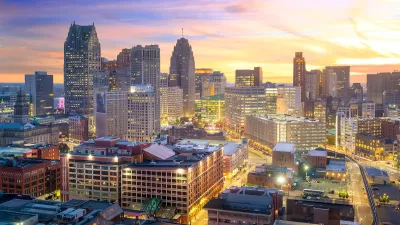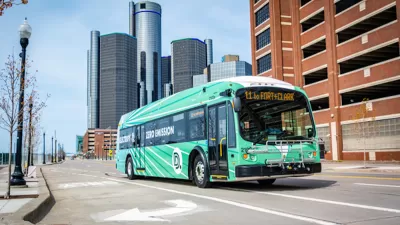Detroit, now no stranger to demolitions, ought to rethink what it does with its abandoned, historic buildings--which have long been bulldozed without much of a second thought.
"In recent weeks, this disconnect surfaced again as officials grappled with the fates of two vacant landmark structures near the city center. Neither the Lafayette Building, a 14-story office building from the 1920s, nor the iconic Michigan Central Station, designed by the same firm that built Grand Central in New York, bears any resemblance to a devastated foursquare, vacant or otherwise. The thing is, significant historic structures like the Lafayette building and Michigan Central Station are often dumped in the same bucket as any other vacant buildings and do not benefit from a comprehensive redevelopment strategy to get them back online. The result is the continued erosion of downtown Detroit's world-class stock of pre-World War II urban fabric, despite the fact that there have been more successful rehab projects in the central business district during the last five years than in the last five decades.
The most frustrating thing for urbanists is that there is so little rhyme or reason to how the city disposes of these buildings. With no plan for replacement, the creeping creation of vacant lots in the name of "much needed" parking or blight removal is insidious. Since 1998, the city has spent at least $50 million to demolish well over two million square feet of Detroit heritage."
FULL STORY: Contemplating Another Path for Detroit’s Historic Assets

Planetizen Federal Action Tracker
A weekly monitor of how Trump’s orders and actions are impacting planners and planning in America.

Restaurant Patios Were a Pandemic Win — Why Were They so Hard to Keep?
Social distancing requirements and changes in travel patterns prompted cities to pilot new uses for street and sidewalk space. Then it got complicated.

Map: Where Senate Republicans Want to Sell Your Public Lands
For public land advocates, the Senate Republicans’ proposal to sell millions of acres of public land in the West is “the biggest fight of their careers.”

Maui's Vacation Rental Debate Turns Ugly
Verbal attacks, misinformation campaigns and fistfights plague a high-stakes debate to convert thousands of vacation rentals into long-term housing.

San Francisco Suspends Traffic Calming Amidst Record Deaths
Citing “a challenging fiscal landscape,” the city will cease the program on the heels of 42 traffic deaths, including 24 pedestrians.

California Homeless Arrests, Citations Spike After Ruling
An investigation reveals that anti-homeless actions increased up to 500% after Grants Pass v. Johnson — even in cities claiming no policy change.
Urban Design for Planners 1: Software Tools
This six-course series explores essential urban design concepts using open source software and equips planners with the tools they need to participate fully in the urban design process.
Planning for Universal Design
Learn the tools for implementing Universal Design in planning regulations.
Heyer Gruel & Associates PA
JM Goldson LLC
Custer County Colorado
City of Camden Redevelopment Agency
City of Astoria
Transportation Research & Education Center (TREC) at Portland State University
Camden Redevelopment Agency
City of Claremont
Municipality of Princeton (NJ)





























